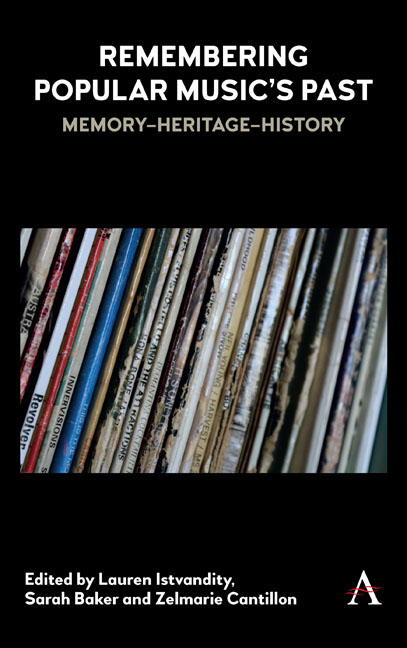Book contents
- Frontmatter
- Contents
- List of Figures
- Acknowledgements
- Chapter 1 The Precarity of Memory, Heritage and History in Remembering Popular Music's Past
- Part I MEMORY
- Part II HERITAGE
- Chapter 7 Mark II: Reworking the Heritage B(r)and
- Chapter 8 The Continually Precarious State of the Musical Object
- Chapter 9 Showing Off: Taking Popular Music Research into the Museum
- Chapter 10 Preserving Icelandic Popular Music Heritage: Issues of Collection, Access and Representation
- Chapter 11 Questioning the Future of Popular Music Heritage in the Age of Platform Capitalism
- Part III HISTORY
- List of Contributors
- Index
Chapter 11 - Questioning the Future of Popular Music Heritage in the Age of Platform Capitalism
from Part II - HERITAGE
Published online by Cambridge University Press: 09 July 2019
- Frontmatter
- Contents
- List of Figures
- Acknowledgements
- Chapter 1 The Precarity of Memory, Heritage and History in Remembering Popular Music's Past
- Part I MEMORY
- Part II HERITAGE
- Chapter 7 Mark II: Reworking the Heritage B(r)and
- Chapter 8 The Continually Precarious State of the Musical Object
- Chapter 9 Showing Off: Taking Popular Music Research into the Museum
- Chapter 10 Preserving Icelandic Popular Music Heritage: Issues of Collection, Access and Representation
- Chapter 11 Questioning the Future of Popular Music Heritage in the Age of Platform Capitalism
- Part III HISTORY
- List of Contributors
- Index
Summary
Introduction
The realm of recorded music has recently entered a new era. Following almost 20 years of uncertainty and upheavals, which commenced with the advent and success of Napster and illegal downloading of music files in the late 1990s (see Nowak and Whelan 2014), modes of music distribution and consumption are increasingly centred on music streaming platforms (see IFPI 2017). The implementation, and then increasing success, of music streaming platforms such as Spotify, Google Play, TIDAL, Apple Music, Deezer or Pandora changed the ways in which music content is distributed and interacted with by consumers. Distribution of music through streaming platforms primarily relies on immediate access to content, and such access is largely mediated by algorithmic processes. The prominence of playlists in consumption patterns and the constant browsing through a great array of content are the two main instances of how the modes of music distribution and consumption are changing in the age of ‘platform capitalism’ (Srnicek 2016, 2017). At a time when the preservation of popular music heritage has somewhat become an ‘obsession’ (see Baker 2015, 2017; Le Guern 2015), contemporary cultural transformations in the ways music is valued raise significant questions about what content will be worth preserving and celebrating in the near future. Institutions committed to popular music heritage preservation draw largely on the concept of cultural significance in their narration of popular music histories in exhibitions (see Baker et al. 2016a, 2016b, 2018). Halls of fame for instance induct artists that are deemed significant, even though the criteria vary across different institutions (see Nowak and Baker 2018). This chapter draws on the premise that a turn to platforms in the distribution and consumption of music will change consumers’ relationship with music and present significant issues for the future of music heritage preservation. To put it plainly, what music will be worth preserving in the coming years? This chapter explores current transformations in modes of music distribution and consumption, and how, subsequently, the ways music is culturally valued also change, and how this impacts upon the preservation of its heritage. In the first section, I provide a brief overview of platform capitalism, as well as the main transformations that streaming platforms induce in the ways music is accessed, listened to and valued by consumers.
- Type
- Chapter
- Information
- Remembering Popular Music's PastMemory-Heritage-History, pp. 145 - 158Publisher: Anthem PressPrint publication year: 2019



